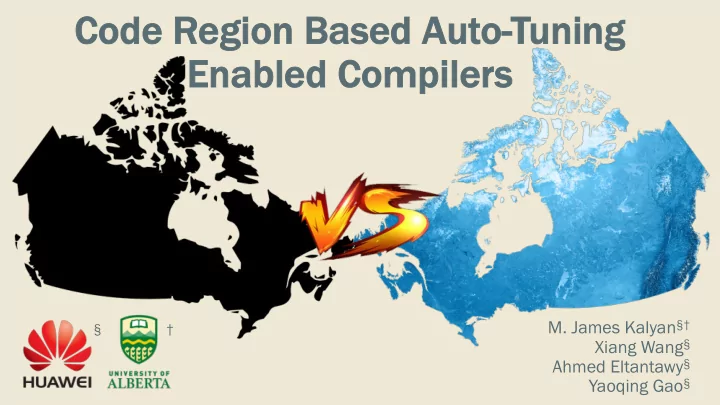

Code R Region B Based A Auto-Tu Tuning En Enabled C Compilers M. James Kalyan §† § † Xiang Wang § Ahmed Eltantawy § Yaoqing Gao §
Motivation Binary Developer 2
Motivation Binary Auto-Tuner 3
Approach .6% speedup over standard optimization Up to 19.6 .5% over coarse grained tuning and 11.5 Binary Aware Tuning A Auto-Tuner ler Compile Co 4
High-Level 5
Code Region Tuning • Any segment of IR that can be independently optimized • Loops What is a code region? Code Region Based • Modules Au Auto-Tu Tuning • Basic Blocks 6
Tuning Parameters • Optimization pass selection/order • Loop Unroll/peel count • Machine scheduling policy • Support for more additional tuning parameters was limited by development time Pass Pass Loop 1 Loop 1 Loop 2 Loop 2 Loop 2 Loop 2 Policy 2 Policy 1 1 2 Basic Block 1 Module 1 Pass Pass Policy 1 Policy 2 Basic Block 2 1 3 Module 2 7
Code Region Auto-Tuning • Prerequisites: • Identify t the co code r regions of a given source and the possible optimizations on those code regions This is what we call enabling the How to enable auto-tuning on code regions? • Au Auto-tu tune : automatically make optimization compiler for auto-tuning , which is a necessary step for code region decisions about the code regions based auto-tuning • Apply t the o optimization decisions when compiling 8
Code Region Auto-Tuning (for the diagrammatically inclined) These decisions are recorded The auto-tuner’s search The tuned binary is compiled The tuning configuration is read We penetrate LLVM’s pass The code regions are as a tuning configuration in an and profiled, the performance by the compiler and the correct algorithms make decisions analysis to record tuning identified uniquely is given as feedback to the about what optimizations to optimizations are overridden xml format opportunities ( identify c code search driver apply ( aut regions ) re auto-tu tuning ) Note: the dotted lines are executed once per tuning run 9
Methodology • We built our tuning mechanism using: • OpenTuner • LLVM 4.0 • Search algorithms: OpenTuner’s built-in AUC Bandit meta-technique cycling between: • Differential Evolution, Random Nelder-Mead, Greedy Hill Climbing • Results are shown on the industry benchmarks: CoreMark, HPCG, and Livermore Loops, running on an x86 CPU 10
Experimental Results (CoreMark) Best S Speedup Na Name De Description Coarse S Scope Fine S Scope Over Coarse Over –O2 Phase Ordering of optimization passes All modules Per module 1.115x 1.196x ordering (LLVM IR) Loop Factor to unroll/peel loops by All loops Per loop 1.036x 1.106x unrolling/p (LLVM IR) eeling Machine Scheduling rule for instructions All basic blocks Per basic 1.001x 1.003x scheduling (x86 machine IR) block policy Results for CoreMark on x86 11
Experimental Results (CoreMark) -O2 Potential Speedup Expected Speedup Coarse Coarse Fine Fine Loop Auto-Tuning Module Auto-Tuning Iteration time = time(configuration choice) + time(compile) 12 + time(runtime) ≈ 45s
Experimental Results (others) • HPCG • 5% speedup over coarse grained while tuning loops • Livermore Loops • 2% speedup over coarse grained while tuning loops 13
Related Work • Code Region Oblivious Auto-Tuning • Compiler as a black box • Compiler Auto-Tuning Survey (2018) • GCC flag tuning with CK-autotuning framework • Isolated Code Region Based Auto-Tuning • Predicting Unroll Factors Using Supervised Classification • Code Region Based Auto-Tuning • Region-Aware Multi-Objective Auto-Tuner for Parallel Programs (2017) • Code region based thread count tuning for parallelization 14
Limitations/Future Work • Have not identified/implemented many code regions or fine grained optimizations • Support more code region types and optimizations A new host of challenges • Optimizations disrupt the IR—can lose track of CRIDs • Auto-tuning stages • Iterative compiler auto-tuning is time-expensive and must be done per program • RNN/RL approach for predicting compiler configurations 15
Future Work: Predictive Tuning Challenges • Predict configurations for code regions of arbitr trary ty type • Features to describe any code region (while minimizing noise) • Feature extraction (encompass code region and program info) • Label vectors of variable size (pass sequences) • Stage based tuning is remaining issue 16
Summary • Problem: • Current compiler auto-tuning methods are missing out on performance peaks • Approach: • Enabled code region based (fine grained) tuning within the compiler • Results: • Observed speedup over standard optimization and coarse grained tuning 17
Recommend
More recommend